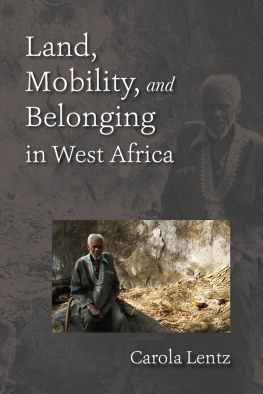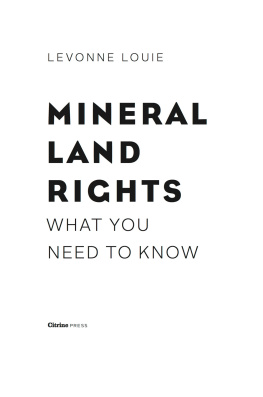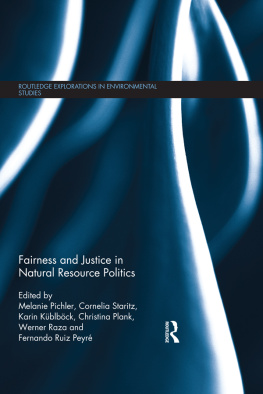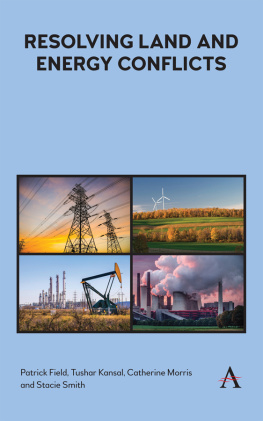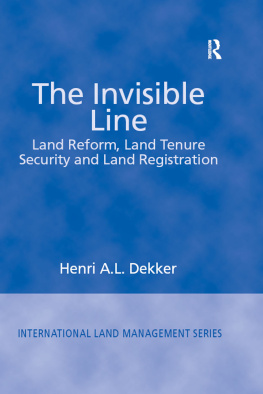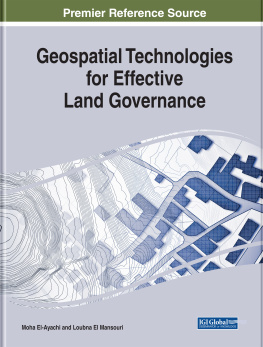
Land Reforms and Natural Resource Conflicts in Africa
This book is a critical examination of the place and role of land in Africa, the role of land in political formation and national identification and the land as an economic resource within both national economic development and liberal globalization. Colonial and postcolonial conflicts have been rooted in four related claims: the struggle over scarce resources, especially access to land resources; abundance of natural resources mismanaged or appropriated by the states, local power systems and multinationals; weak or absent articulated land tenure policies, leading to speculation or hybrid policy framework; and the imperatives of the global liberalization based on the free market principles to regulate the land question and mineral appropriation issue. The actualization of these combined claims has led to conflicts among ethnic groups or between them and governments. This book is not only about conflicts but also about local policy achievements that have been produced on the land question. It provides a critical understanding of the forces and claims related to land tenure systems, as part of the state policy and its system of governance.
Tukumbi Lumumba-Kasongo is professor of political science at Wells College, a visiting scholar in the Department of City and Regional Planning at Cornell University, and an external examiner at the University of Ghana.
Routledge African Studies
1 Facts, Fiction, and African Creative Imaginations
Edited by Toyin Falola and Fallou Ngom
2 The Darfur Conflict
Geography or Institutions?
Osman Suliman
3 Music, Performance and African Identities
Edited by Toyin Falola and Tyler Fleming
4 Environment and Economics in Nigeria
Edited by Toyin Falola and Adam Paddock
5 Close to the Sources: Essays on Contemporary African Culture, Politics and Academy
Abebe Zegeye and Maurice Vambe
6 Landscape and Environment in Colonial and Postcolonial Africa
Edited by Toyin Falola and Emily Brownell
7 Development, Modernism and Modernity in Africa
Edited by Augustine Agwuele
8 Natural Resources, Conflict, and Sustainable Development
Lessons from the Niger Delta
Edited by Okechukwu Ukaga, Ukoha O. Ukiwo and Ibaba Samuel Ibaba
9 Regime Change and Succession Politics in Africa
Five Decades of Misrule
Edited by Maurice Nyamanga Amutabi and Shadrack Wanjala Nasongo
10 The Political Economy of Development and Underdevelopment in Africa
Edited by Toyin Falola and Jessica Achberger
11 Pan-Africanism, and the Politics of African Citizenship and Identity
Edited by Toyin Falola and Kwame Essien
12 Securing Africa
Local Crises and Foreign Interventions
Edited by Toyin Falola and Charles Thomas
13 African Youth in Contemporary Literature and Popular Culture
Identity Quest
Edited by Vivian Yenika-Agbaw and Lindah Mhando
14 Indigenous Discourses on Knowledge and Development in Africa
Edited by Edward Shizha and Ali A. Abdi
15 African Culture and Global Politics
Language, Philosophies, and Expressive Culture in Africa and the Diaspora
Edited by Toyin Falola and Danielle Porter Sanchez
16 Urbanization and Socio-Economic Development in Africa
Challenges and Opportunities
Edited by Steve Kayizzi-Mugerwa, Abebe Shimeles and Nadge Dsire Yamogo
17 Continuity and Change in Sub-Saharan African Demography
Edited by Clifford O. Odimegwu and John Kekovole
18 Sexual Violence in Conflict and Post-Conflict Societies
International Agendas and African Contexts
Edited by Doris Buss, Joanne Lebert, Blair Rutherford, Donna Sharkey and Obijiofor Aginam
19 Land Reforms and Natural Resource Conflicts in Africa
New Development Paradigms in the Era of Global Liberalization
Edited by Tukumbi Lumumba-Kasongo
Land Reforms and Natural Resource Conflicts in Africa
New Development Paradigms in the Era of Global Liberalization
Edited by Tukumbi Lumumba-Kasongo
First published 2016
by Routledge
711 Third Avenue, New York, NY 10017
and by Routledge
2 Park Square, Milton Park, Abingdon, Oxon OX14 4RN
Routledge is an imprint of the Taylor & Francis Group, an informa business
2016 Taylor & Francis
The right of the editor to be identified as the author of the editorial material, and of the authors for their individual chapters, has been asserted in accordance with sections 77 and 78 of the Copyright, Designs and Patents Act 1988.
All rights reserved. No part of this book may be reprinted or reproduced or utilised in any form or by any electronic, mechanical, or other means, now known or hereafter invented, including photocopying and recording, or in any information storage or retrieval system, without permission in writing from the publishers.
Trademark Notice : Product or corporate names may be trademarks or registered trademarks, and are used only for identification and explanation without intent to infringe.
Library of Congress Cataloging-in-Publication Data
Land reforms and natural resource conflicts in Africa: new development paradigms in the era of global liberalization / edited by Tukumbi Lumumba-Kasongo.
pages cm. (Routledge African studies; 19)
Includes bibliographical references and index.
1. Land reformAfrica. 2. Land use, RuralGovernment policy Africa. 3. Agriculture and stateAfrica. 4. Land tenureAfrica. I. Lumumba-Kasongo, Tukumbi, 1948 editor.
HD1333.A35L363 2016
333.316dc23
2015014999
ISBN: 978-1-138-88882-1 (hbk)
ISBN: 978-1-315-71314-4 (ebk)
Typeset in Sabon
by Apex CoVantage, LLC
To the African farmers who sustain millions of lives through their complex agricultural activities and hard work with particular appreciation for the women.
Contents
| TUKUMBI LUMUMBA-KASONGO |
| GEORGE KLAY KIEH, JR. |
| B. C. CHIKULO |
| CHARLES C. FONCHINGONG AND MAURICE UFON BESENG |
| N'DRI T. ASSI-LUMUMBA |
| JUDE NDZIFON KIMENGSI |
| SABELO J. NDLOVU-GATSHENI AND CHIMUSORO KENNETH TAFIRA |
| KWAME A. NINSIN |
| TUKUMBI LUMUMBA-KASONGO |
| EDWARD KANNYO |
| TUKUMBI LUMUMBA-KASONGO |
Issues, Objectives and About the Cases
Tukumbi Lumumba-Kasongo
Between 2005 and 2007, African countries were listed among the top ten countries that were the most undernourished populations in the world, with the Democratic Republic of Congo being the number one with 69%. Eritrea was number two with 64%; Burundi, third with 62%; Haiti, fourth with 57%; the Comoros, fifth with 46%; Zambia, sixth with 43%; Angola, seventh with 41%; Ethiopia, eighth with 41%; the Central African Republic, ninth with 40%; and Mozambique, tenth with 38% (United Nations World Food Programme 2010).
In addition to the food insecurity issue, food dependency and food aid also characterize the major issues related to the question of land, its availability and the policies and practices about its usage. Furthermore, among the top ten worlds leading food aid recipients in 2010, six were located in Africa: Ethiopia with 24.9%, Sudan 8.4%, Kenya 4.5%, Republic Democratic Republic of Congo 3.4%, Niger 2.8% and Chad 2.0% (United Nations World Food Programme 2010). This dependency is a health issue as well as a national security issue.


